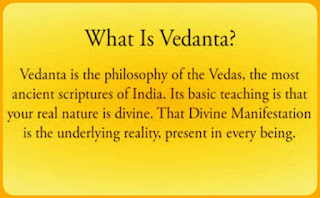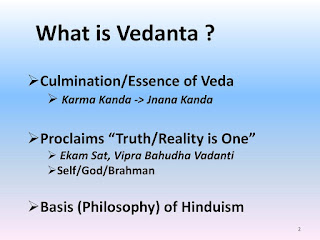Vedanta, also known as Uttara Mimamsa, is one of the six major philosophical schools of Hinduism. It is based on the teachings and interpretations of the Vedas, which are ancient Hindu scriptures. Vedanta is considered the culmination and essence of Vedic wisdom.
The word "Vedanta" is derived from two Sanskrit words: "Veda" (knowledge) and "anta" (end or culmination). Hence, Vedanta can be understood as the end or culmination of knowledge as presented in the Vedas. It is a philosophical system that explores the nature of reality, the self (Atman), and the ultimate truth (Brahman).
Vedanta philosophy encompasses various texts, the most important being the Upanishads, which are considered the culmination of the Vedas. The Upanishads explore profound metaphysical and spiritual concepts and are the primary source of Vedanta teachings. Other important texts in Vedanta include the Brahma Sutras (also known as the Vedanta Sutras) and the Bhagavad Gita.
Vedanta philosophy emphasizes the concept of non-duality (Advaita) and the identity of the individual self (Atman) with the ultimate reality (Brahman). It teaches that the ultimate goal of human life is to realize this non-dual nature and attain liberation (Moksha) from the cycle of birth and death.
Different sub-schools or interpretations of Vedanta have emerged over time, including Advaita Vedanta, Vishishtadvaita Vedanta, and Dvaita Vedanta. Each of these sub-schools presents its own understanding and philosophical perspectives within the broader framework of Vedanta.
Vedanta has had a profound influence on Indian philosophy, spirituality, and culture. It continues to be studied, practiced, and taught by scholars, spiritual seekers, and philosophers worldwide. The teachings of Vedanta have also inspired various spiritual leaders and have been incorporated into other religious and philosophical traditions.
1. Prerequisites for studying Vedanta:
Vedanta is considered to be an advanced philosophical system that requires a strong foundation in the study of the Vedas, including the rituals and practices prescribed in the earlier portions of the Vedas known as the Karma Kanda. The study of Vedanta is typically undertaken by those who have already fulfilled their worldly duties and are ready to engage in deep spiritual inquiry.
2. Three pillars of Vedanta:
Vedanta philosophy is often summarized by three fundamental principles:
- Brahma Satyam: Brahman, the ultimate reality, is the only truth. The material world is temporary and illusionary.
- Jagan Mithya: The world we perceive is a product of Maya (illusion) and is not ultimately real.
- Jivo Brahmaiva Napara: The individual self (Jiva) and Brahman (ultimate reality) are not separate entities but are ultimately one.
3. Methods of knowledge in Vedanta:
Vedanta recognizes three primary means of acquiring knowledge (Pramanas):
- Pratyaksha (Direct perception): Knowledge gained through direct sensory perception.
- Anumana (Inference): Knowledge obtained through logical reasoning and inference.
- Shruti (Scriptural testimony): Knowledge transmitted through sacred texts like the Upanishads, which are considered the ultimate authority in Vedanta.
4. Paths of realization:
Vedanta recognizes three main paths (Yogas) to realize the truth and attain liberation (Moksha):
- Jnana Yoga: The path of knowledge and wisdom, which involves intellectual inquiry, self-reflection, and the direct realization of one's true nature.
- Bhakti Yoga: The path of devotion and surrender to a personal deity, emphasizing love, devotion, and worship as a means to unite with the divine.
- Karma Yoga: The path of selfless action, emphasizing performing one's duties without attachment to the results, cultivating a sense of detachment and selflessness.
5. Key figures in Vedanta:
Vedanta has been expounded by numerous philosophers and spiritual teachers throughout history. Some prominent figures include:
- Adi Shankaracharya: An influential philosopher who revived Advaita Vedanta in the 8th century CE and wrote commentaries on the Upanishads, Bhagavad Gita, and Brahmasutras.
- Ramanuja: A 12th-century philosopher who advocated Vishishtadvaita Vedanta, emphasizing the individual soul's eternal relationship with Brahman.
- Madhva: A 13th-century philosopher who founded Dvaita Vedanta, emphasizing the eternal distinction between the individual soul and Brahman.
1. Maya:
Maya is a central concept in Vedanta. It refers to the power of Brahman that creates the illusion of the material world and veils the true nature of reality. Maya makes the finite world appear real, despite being ultimately illusory. Understanding and transcending Maya is an important aspect of spiritual realization in Vedanta.
2. Five Sheaths (Pancha Koshas):
According to Vedanta, the human being is composed of five layers or sheaths that encase the true self (Atman). These sheaths are:
- Annamaya Kosha: The physical sheath consisting of the body and senses.
- Pranamaya Kosha: The vital energy sheath governing life functions and breath.
- Manomaya Kosha: The mental sheath associated with thoughts, emotions, and desires.
- Vijnanamaya Kosha: The intellectual sheath involved in discernment and higher knowledge.
- Anandamaya Kosha: The bliss sheath representing the deepest level of happiness and spiritual experience.
3. Neti-Neti:
Neti-Neti is a method of negation used in Vedanta. It means "not this, not this" and is employed to guide the seeker to realize the ultimate truth by negating the identification with the temporary and changing aspects of existence. By negating what is not the true self, one arrives at the realization of the eternal and unchanging nature of Brahman.
4. Concept of Gunas:
Vedanta acknowledges the three Gunas (qualities) that are present in the material world. These Gunas are:
- Sattva: The quality of purity, knowledge, and harmony.
- Rajas: The quality of passion, activity, and restlessness.
- Tamas: The quality of darkness, inertia, and ignorance.
Vedanta explains that these Gunas influence the individual's thoughts, actions, and perceptions and that transcending the Gunas is essential for spiritual growth and realization.
5. Advaita Vedanta and Dvaita Vedanta:
Advaita Vedanta, founded by Adi Shankaracharya, asserts the non-dual nature of reality, emphasizing that the individual self (Atman) is identical to the ultimate reality (Brahman). Dvaita Vedanta, founded by Madhva, upholds the philosophy of dualism, emphasizing the eternal distinction between the individual soul and God (Vishnu).
These are further insights into the concepts and aspects of Vedanta. The philosophy of Vedanta provides a comprehensive framework for understanding the nature of reality, the self, and the path to spiritual liberation. It continues to be studied, contemplated, and practiced by seekers and scholars worldwide.
Top Brands


No comments:
Post a Comment